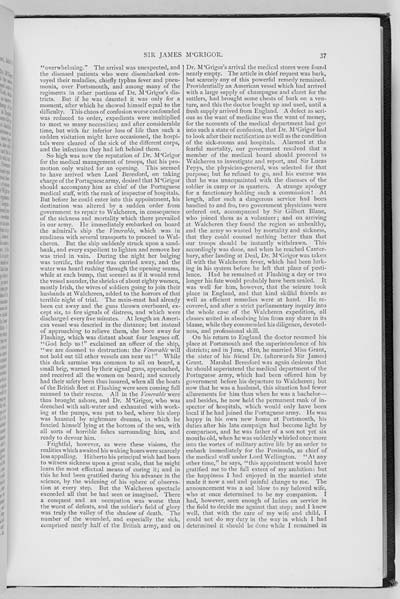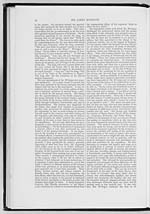37
"overwhelming." The arrival was unexpected, and
the diseased patients who were disembarked con-
veyed their maladies, chiefly typhus fever and pneu-
monia, over Portsmouth, and among many of the
regiments in other portions of Dr. M 'Grigor's dis-
tricts. But if he was daunted it was only for a
moment, after which he showed himself equal to the
difficulty. This chaos of confusion worse confounded
was reduced to order, expedients were multiplied
to meet so many necessities; and after considerable
time, but with far inferior loss of life than such a
sudden visitation might have occasioned, the hospi-
tals were cleared of the sick of the different corps,
and the infections they had left behind them.
So high was now the reputation of Dr. M'Grigor
for the medical management of troops, that his pro-
motion only waited for an opening. This seemed
to have arrived when Lord Beresford, on taking
charge of the Portuguese army, desired that M 'Grigor
should accompany him as chief of the Portuguese
medical staff, with the rank of inspector of hospitals.
But before he could enter into this appointment, his
destination was altered by a sudden order from
government to repair to Walcheren, in consequence
of the sickness and mortality which there prevailed
in our army. He immediately embarked on board
the admiral's ship the Venerable, which was in
readiness with several transports to proceed to Wal-
cheren. But the ship suddenly struck upon a sand-
bank, and every expedient to lighten and remove her
was tried in vain. During the night her bulging
was terrific, the rudder was carried away, and the
water was heard rushing through the opening seams,
while at each bump, that seemed as if it would rend
the vessel asunder, the shrieks of about eighty women,
mostly Irish, the wives of soldiers going to join their
husbands at Walcheren, added to the horrors of that
terrible night of trial. The main-mast had already
been cut away and the guns thrown overboard, ex-
cept six, to fire signals of distress, and which were
discharged every five minutes. At length an Ameri-
can vessel was descried in the distance; but instead
of approaching to relieve them, she bore away for
Flushing, which was distant about four leagues off.
"God help us!" exclaimed an officer of the ship,
"we are doomed to destruction: the Venerable will
not hold out till other vessels can near us!" While
this dark surmise was common to all on board, a
small brig, warned by their signal guns, approached,
and received all the women on board; and scarcely
had their safety been thus insured, when all the boats
of the British fleet at Flushing were seen coming full
manned to their rescue. All in the Venerable were
thus brought ashore, and Dr. M'Grigor, who was
drenched with salt-water and exhausted with work-
ing at the pumps, was put to bed, where his sleep
was haunted by nightmare dreams, in which he
fancied himself lying at the bottom of the sea, with
all sorts of horrible fishes surrounding him, and
ready to devour him.
Frightful, however, as were these visions, the
realities which awaited his waking hours were scarcely
less appalling. Hitherto his principal wish had been
to witness sickness upon a great scale, that he might
learn the most effectual means of curing it; and in
this he had been gratified during his advance in the
science, by the widening of his sphere of observa-
tion at every step. But the Walcheren spectacle
exceeded all that he had seen or imagined. There
a conquest and an occupation was worse than
the worst of defeats, and the soldier's field of glory
was truly the valley of the shadow of death. The
number of the wounded, and especially the sick,
comprised nearly half of the British army, and on
Dr. M 'Grigor's arrival the medical stores were found
nearly empty. The article in chief request was bark,
but scarcely any of this powerful remedy remained.
Providentially an American vessel which had arrived
with a large supply of champagne and claret for the
suttlers, had brought some chests of bark on a ven-
ture, and this the doctor bought up and used, until a
fresh supply arrived from England. A defect as seri-
ous as the want of medicine was the want of money,
for the accounts of the medical department had got
into such a state of confusion, that Dr. M'Grigor had
to look after their rectification as well as the condition
of the sick-rooms and hospitals. Alarmed at the
fearful mortality, our government resolved that a
member of the medical board should proceed to
Walcheren to investigate and report, and Sir Lucas
Pepys, the physician-general, was selected for that
purpose; but he refused to go, and his excuse was
that he was unacquainted with the diseases of the
soldier in camp or in quarters. A strange apology
for a functionary holding such a commission! At
length, after such a dangerous service had been
bandied to and fro, two government physicians were
ordered out, accompanied by Sir Gilbert Blane,
who joined them as a volunteer; and on arriving
at Walcheren they found the region so unhealthy,
and the army so wasted by mortality and sickness,
that they could counsel nothing better than that
our troops should be instantly withdrawn. This
accordingly was done, and when he reached Canter-
bury, after landing at Deal, Dr. M'Grigor was taken
ill with the Walcheren fever, which had been lurk-
ing in his system before he left that place of pesti-
lence. Had he remained at Flushing a day or two
longer his fate would probably have been sealed. It
was well for him, however, that the seizure took
place in England, and that kind skilful friends as
well as efficient remedies were at hand. He re-
covered, and after a strict parliamentary inquiry into
the whole case of the Walcheren expedition, all
classes united in absolving him from any share in its
blame, while they commended his diligence, devoted-
ness, and professional skill.
On his return to England the doctor resumed his
place at Portsmouth and the superintendence of his
districts; and in June, 1810, he married Miss Grant,
the sister of his friend Dr. (afterwards Sir James)
Grant. Marshal Beresford was again desirous that
he should superintend the medical department of the
Portuguese army, which had been offered him by
government before his departure to Walcheren; but
now that he was a husband, this situation had fewer
allurements for him than when he was a bachelor�
and besides, he now held the permanent rank of in-
spector of hospitals, which would only have been
local if he had joined the Portuguese army. He was
happy in his own new home at Portsmouth, his
duties after his late campaign had become light by
comparison, and he was father of a son not yet six
months old, when he was suddenly whirled once more
into the vortex of military active life by an order to
embark immediately for the Peninsula, as chief of
the medical staff under Lord Wellington. "At any
other time," he says, "this appointment would have
gratified me to the full extent of my ambition: but
the happiness I had enjoyed in the married state
made it now a sad and painful change to me. The
announcement was a sad blow to my beloved wife,
who at once determined to be my companion. I
had, however, seen enough of ladies on service in
the field to decide me against that step; and I knew
well, that with the care of my wife and child, I
could not do my duty in the way in which I had
determined it should be done while I remained in

![]() Universal Viewer |
Universal Viewer | ![]() Mirador |
Large image | Transcription
Mirador |
Large image | Transcription
![]()

